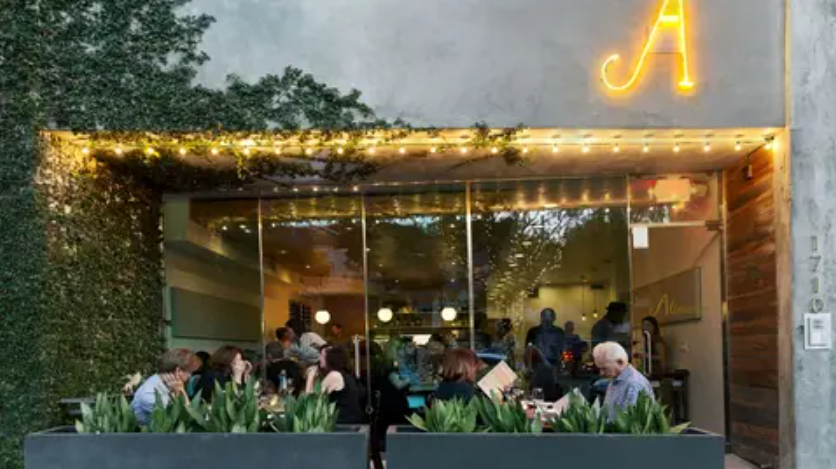The owner of a popular Los Angeles eatery is facing backlash after a local podcaster called out the small restaurant on social media for adding a 4% surcharge to customers' checks. The surcharge, which covers the cost of healthcare for employees, has sparked outrage and criticism from some who believe the fee is unfair and unethical.
The restaurant, Alimento, located in the hip Silver Lake neighborhood of Los Angeles, has been receiving hate mail and threats of protests since the surcharge controversy began. Dave Anthony, a comedian with the podcast "The Dollop," took issue with the surcharge and a $3 "water donation" fee and posted his frustration on Twitter on July 3rd.
"Lotta bullshit going on here, including charging for tap water (illegal)," Anthony tweeted after receiving his bill from Alimento.
Many social media users joined in on the criticism, with several questioning why the restaurant did not simply raise menu prices instead of adding a surcharge. Others expressed concerns over how the surcharge would impact employees on slow nights or if customers opted out. The backlash also extended to the additional water donation fee, which some argued was excessive.
At the bottom of the bill, the restaurant noted that a service charge is included to cover the cost of providing healthcare to their staff. The customers were given the option to have this charge removed if they wished. It is unclear if Anthony requested for the surcharge to be removed, as he could not be reached for comment.
The post quickly went viral, receiving dozens of responses and garnering widespread attention. Critics of the surcharge likened it to a typical fee list for Airbnb rentals, expressing disappointment in the state of the restaurant industry in North America. Some pointed out that this issue could be easily resolved by providing employees with a decent salary and health benefits, rather than implementing surcharges and relying on customer tips.
In response to the uproar, Zach Pollack, the chef-owner of Alimento, took to Instagram to address the controversy and defend his restaurant. He referred to the backlash as a "rant" and questioned why his establishment was being singled out for something that has been a common practice in the restaurant industry since the passing of the Affordable Care Act.
Pollack further explained that Alimento has fewer than 25 full-time employees, so the restaurant is not legally obligated to provide health insurance. However, the restaurant has chosen to offer this benefit to its employees, and the 4% surcharge helps cover the costs. He also acknowledged that the surcharge does not cover the bulk of healthcare costs for the staff, but it is an attempt to show transparency and be upfront with customers.
What in the world is this?
Just received this from a friend. Restaurants in LA are charging a 4% “LA Health” fee
The charge is to keep “employees healthy and happy” and is apparently city wide to have customers cover health insurance for restaurant employees
🤡🤡🤡 pic.twitter.com/EW1O3jONp5
— Ashley St. Clair (@stclairashley) January 14, 2024
Supporters of the restaurant applauded Pollack for explaining the purpose of the surcharge and expressed understanding as to why it is necessary for small businesses to implement such fees. They argued that customers would complain about rising menu prices, and this was a fair compromise to ensure employees received adequate health benefits.
The controversy over surcharges extends beyond Alimento and the city of Los Angeles. As minimum wage and healthcare costs continue to rise for service workers, many restaurants across the country have started adding surcharges to cover these expenses. In California, this has been a widespread practice for years, particularly in San Francisco, where small businesses are required to provide healthcare benefits to their employees.
Even fast-food chains have joined the trend, with a Pizza Hut franchisee in Los Angeles recently adding a service fee to cover the high costs of doing business in California. This issue has also sparked debates on a larger scale, with a survey by the National Restaurant Association finding that one in six restaurants have added fees or surcharges to customer checks to offset rising costs.
Despite this, there has been pushback from both customers and employees in some cases. In January of this year, two Dallas restaurants faced criticism and negative reviews on Yelp and Google after adding a 3% surcharge to customer checks. Some employees have also questioned whether these fees actually benefit them, as seen in the case of a Los Angeles restaurant being sued by staff over the company's 18% service charge, which they claim results in reduced tips.
The California Restaurant Association (CRA) does not have a stance on surcharges, but they do provide guidelines to restaurant members on how to implement them transparently. However, despite Alimento's efforts to be transparent and upfront about their surcharge, the restaurant has still faced significant backlash and threats of protests. As Pollack expressed, this not only hurts the small business but also the hardworking employees who rely on the restaurant for their livelihood.

